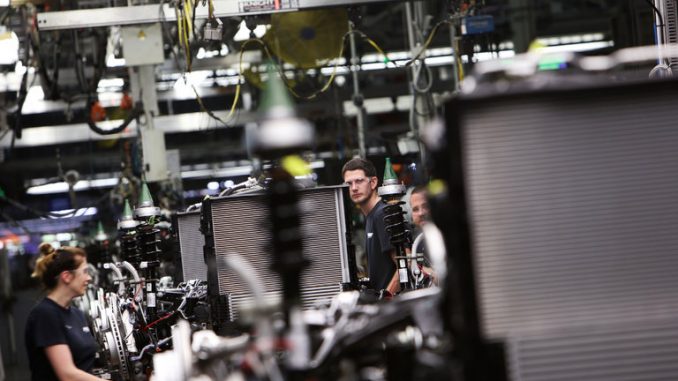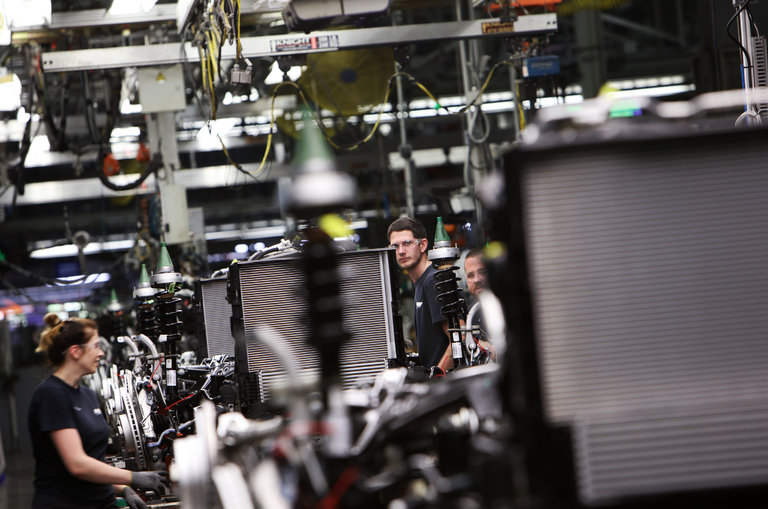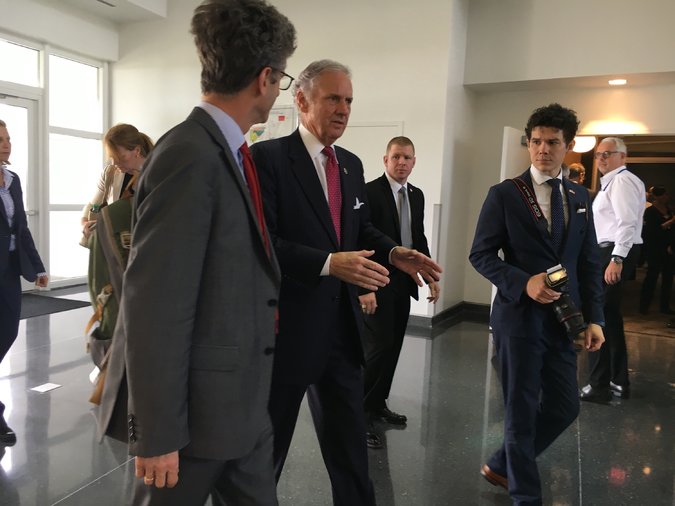
“What concerns me is lack of understanding about the global economy.” Trump’s feud w Angela Merkel on trade strikes disquieting chord in thriving Southern areas that have opened themselves to global trade, and particularly welcomed German auto manufacturers, seeing them as gold standard of prestige and economic stimulus. “There is a real sense of urgency that we need to be clear to BMW and anyone else who would listen we can’t take this kind of rhetoric lightly. For us, this isn’t a political issue. It’s a matter of livelihoods, and a regional economy, and a lot of other things going on here.” Trump’s latest salvos against Germany have drawn criticism from other RPBs in a state that is home to 160 German companies, where German investment from 2011 to 2016 totaled $4.6 billion, resulting in more than 10,000 new jobs in South Carolina. “I’m a little bit surprised and disappointed that the president has chosen to attack before he gets his facts straight.” But the same areas have also proved to be reliable bases of support for Trump, underscoring the unresolved tension between corporatist and populist tendencies within both the administration and broader Trump coalition. Here, workers at BMW plant in Greer, S.C., which employs about 8,800 people and rolls out roughly 1,400 vehicles a day.
No matter that Greer, South Carolina sits squarely in the middle of Trump country:
The president, with his criticism of German trade policy, was setting off alarm bells in the mind of Mayor Richard W. Danner.
Trump, on his recent trip to Europe, reportedly declared the Germans “bad, very bad” on trade;
Greer’s City Hall sits mere miles from a BMW automobile plant that employs about 8,800 people.
And so after Danner read the news here, he quickly organized a call with Chamber of Commerce officials,
who on Tuesday brainstormed ways to reassure BMW executives that they in fact considered them to be good — very good.
“There was a real sense of urgency that we need to be clear to BMW and to anyone else who would listen that we can’t take this kind of rhetoric lightly,”
said Danner, who was elected to Greer’s nonpartisan mayor’s office in 1999.
“For us, this isn’t a political issue.
This is a matter of livelihoods and of a regional economy and a lot of other things that are going on here.”
US South A Big Recipient Of German Investment AND Supporters Of Trump
Trump’s brewing feud with the German chancellor, Angela Merkel, on trade policy —
which included an early-morning tweet Tuesday bemoaning “a MASSIVE trade deficit with Germany” —
has struck a disquieting chord in thriving Southern areas like this one that have opened themselves to global trade,
and particularly welcomed German auto manufacturers, considering them a gold standard of prestige and economic stimulus.
But the same areas have also proved to be reliable bases of support for Trump,
underscoring the unresolved tension between globalist and protectionist tendencies
within both the administration and the broader Trump coalition.
South Carolina Epicenter of Trump / German Investment Tensions
In few places is the tension more evident than South Carolina.
The current governor, Henry McMaster, a Republican, was an early and ardent supporter of Trump.
The previous governor, Nikki R. Haley, made attracting foreign and outside investment a central theme of her tenure,
aggressively marketing the state’s low-tax and anti-union policies to potential manufacturers.
Ms. Haley, a Republican, now serves as Trump’s envoy to the United Nations.
McMaster was not available for an interview, his spokesman said on Wednesday, and Haley did not respond to an interview request.
But both have spoken passionately about of BMW’s importance to South Carolina in the past:
Ms. Haley said in 2011 that it had become “a South Carolina company.”
Last week, McMaster visited Greer with a German government minister.
Trump’s latest salvos against Germany have drawn criticism in recent days from other Republicans in a state
that is home to 160 German companies and where German investment from 2011 to 2016 totaled $4.6 billion,
resulting in more than 10,000 new jobs in South Carolina, according to data from the state Department of Commerce.
“I’m a little bit surprised and disappointed that the president has chosen to attack before he gets his facts straight,”
said Ted Pitts, president and chief executive of the South Carolina Chamber of Commerce,
who previously served as Ms. Haley’s chief of staff and, before that, as a Republican state legislator.
“I guess we’re surprised that he’d try to make this claim at the expense of South Carolina and American jobs.”
Are Trump Comments Serious — Or Misguided Attempts To Bluff ???
Whether Trump’s Twitter messages and comments are just bluster or grounds for a significantly retooled trade stance toward Germany is not altogether clear.
Obama administration officials also expressed frustration with Germany’s vast trade surplus with the US, which stood at $64.8 billion in 2016.
It is also unclear how much control Germany ultimately has over this reality
because its monetary policy is set by the European Central Bank and because of its membership in the European Union.
Gov. Henry McMaster, center, toured the BMW plant in Greer last week before a round-table discussion with several German companies and Brigitte Zypries, the German minister for economic affairs and energy.
Trump has singled out the German auto industry in the past.
In January, in the German newspaper Bild, he threatened to levy a 35% tariff on cars that BMW imported to the United States.
Trump’s Followers Finally Realize How De-Stabilizing His Ignorance Is
The broader concern, in states like South Carolina, is the idea that Trump is presenting foreign companies with new waves of doubt and instability
as they consider expanding or relocating stateside.
“A company like BMW has been around 100 years, and they expect to be around another 100 years,
and so they’re making very serious location decisions based on our trade policies and they expect those to be honored,”
said Doug Woodward, an economics professor at the University of South Carolina.
“They expect those to change, but not fundamentally. And they thought that we were all moving in the direction of more open trade.”
In an interview Wednesday, Germany’s ambassador to US, Peter Wittig, spoke of the ripple effect German auto plants can have:
A 2014 University of South Carolina study noted that for every job at the BMW plant, another three are created elsewhere.
“Anything that impedes the free flow of goods and services and people,
and erects impediments to that free and fair trade order,
is nefarious from our point of view,” Wittig said.
The Southern auto and auto parts industry, in which foreign companies are heavily represented, has its share of critics,
who point to low wages, long hours and safety mishaps that plague a largely nonunionized work force.
But the industries have vigorous defenders on both sides of the aisle.
On Wednesday, Andy Berke, the Democratic mayor of Chattanooga, Tenn., spoke of the Volkswagen plant in town,
which employs 3,200 people and is linked to at least 9,500 jobs at the plant’s suppliers, but has room to expand.
Berke worried that Trump’s words might give the company pause.
“If we move backwards and push our auto suppliers out of the country, that really rolls back the good in Chattanooga,” he said.
In Alabama, State Representative Corey Harbison, a Republican, represents a district that is home to Rehau,
a supplier to a Mercedes-Benz factory in Tuscaloosa County.
Harbison welcomed Trump’s shoot-from-the-hip style.
But he also said, “I’m not sure on this one that it was the best thing to do.”
A number of South Carolinians said they hoped that the Trump administration would recognize the complex reality that has evolved over time here.
Southerners talking about complexity — that’s a laugh.
BMW’s 1992 announcement that it would build a plant in this area was seen as economic salvation for a region that knew its long-dominant textile industry was in its twilight.
Last year, the plant produced more than 411,000 vehicles, making it the largest BMW plant by volume in the world.
According to the company, which did not respond to a request for comment, 70% of those vehicles were exported.
On its campus of shimmering white buildings alongside Interstate 85,
the company, founded in 1916, nods to its past and its future, with an entrance display that promotes “the next 100 years.”
Near the exit of a museum stocked with shining models from days past, a 318i sedan, the first automobile produced here, bears a license plate that reads: “Proud to Call South Carolina Home.”
Over a glass of unsweetened tea in downtown Greer, where local leaders are still weighing how to express their support for BMW,
Mayor Danner said he had learned that Trump’s tweets should be taken “with a grain of salt.”
“The thing that concerns me more than anything else is what I view as a lack of understanding about the global economy,” he said.
“I don’t profess to be an economist, but I know there has to be give and take.”
Source: Trump Targets German Trade, and the South Grimaces – The New York Times

